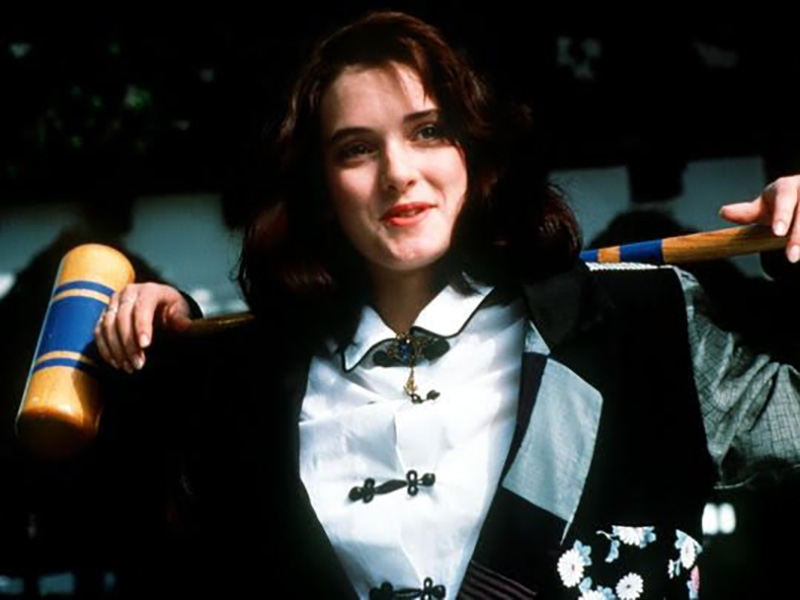Cult classic ‘Heathers’ to celebrate 30th anniversary with LA screening

The 1989 cult classic “Heathers,” starring Winona Ryder, will celebrate its 30th anniversary Thursday with a screening at The Theatre at Ace Hotel. The event will be co-presented by the UCLA Film and Television Archive and the Vidiots Foundation. (Courtesy of NEW WORLD PICTURES)
"Heathers" 30th Anniversary Screening
Thursday, 8 p.m.
The Theatre at Ace Hotel
$20
By Jordan Wilson
April 16, 2019 9:49 p.m.
Making a quality satirical movie has always been difficult, said “Heathers” director Michael Lehmann.
But 30 years after its release, “Heathers” still stands as an iconic critique of other teenage films – Lehmann said it is wonderful yet phenomenally strange that anybody is still paying attention to it.
“Heathers,” originally released in the U.S. in 1989, stars Winona Ryder and Christian Slate as they disrupt the social fabric of their Ohio high school by strategically assassinating popular teenagers. A 30th-anniversary screening of the cult classic will take place at The Theatre at Ace Hotel on Thursday, co-presented by the UCLA Film and Television Archive and the Vidiots Foundation, a film preservation nonprofit. Lehmann, along with “Heathers” screenwriter Daniel Waters and supporting actress Lisanne Falk, will attend the event.
[RELATED: Film archive series to shed light on Hollywood’s unrecognized female directors]
The film was divisive upon release, with many Hollywood critics praising its brash and humorous portrayal of the high school experience, while others thought it was in poor taste, Lehmann said. He often runs into young people today who say they love the film and still sees articles characterizing the film as cartoonish, outrageous and overly violent. But Lehmann said a person who criticizes a still-popular satirical film probably does not understand it.
“They don’t even understand the context in which the movie was made,” Lehmann said. “(They) don’t understand satire anyway, regardless of the lack of context.”
“Heathers” is an example of secret handshake cinema, meaning it has a niche audience regardless of generational divides, Waters said. He said he wrote the movie for it to be appreciated by an audience that understood it, not to be loved universally. The trick, Waters said, is to lull the audience in with a host of cliches so they think they know what kind of movie they are watching and then completely disorient them with a scene of violent death, which divides the audience. He said a scene in which one character crashes into a coffee table after drinking drain cleaner ends in complete silence, setting the tone for the rest of the work and letting the audience know exactly what kind of film it is.
“It’s not working if everyone likes it,” Waters said. “If everyone’s laughing, it must not be very funny.”
Falk said she appreciates the range of topics the film attempts to address, including fat shaming, eating disorders and teenage suicide. After recently watching the film with her teenage daughter, Falk said her daughter resonated most with the social hierarchy of high school as it is portrayed in the film. Falk said she thinks the film distills what it means to be a teenager: not knowing who you are and trying to figure it out in a hostile environment.
Fans feel a shared validation of their adolescent experience when they watch the film, she said. The tone of “Heathers” encapsulates the teenage experience better than the drama of a typical ’80s teenage film, Falk said.
“You have to take a step back and bring some levity to it, to be able to laugh that you don’t cry,” Falk said. “I think that’s what holds up.”
Citing the well-known John Hughes classic, UCLA Film and Television Archive programmer Paul Malcolm said “Heathers” holds up better than “The Breakfast Club” because it is more representative of an actual high school experience. While “The Breakfast Club” presents itself as a comedy with a realistic dramatization of high school anxieties and identities, the harmonious resolution in which every character leaves the film respecting one another was more of a fantasy than the violent climax of “Heathers,” he said. While Hughes’ movies present articulate fantasies of high school events, Malcolm said Lehmann’s depict a social hierarchy audiences can better identify with and situations that reflect the way people experience high school and adolescence, including their own social status.
“Nobody thinks of themselves as a Heather,” Malcolm said. “Everybody thinks of themselves as put down in some way, shape or form because adolescence is such a confusing, crazy time in everybody’s life, and this film captures that in a crazy way.”
After “Heathers,” teen movies could not reuse the same sweet tone they had previously used because the film had already satirized it so well, Waters said. He continues to hear that the film could not be made in today’s violence-averse environment, but he said it was nearly impossible to make even in the ’80s because violence has always been queasy topic.
“What’s the point of getting out of bed if you don’t think they’re going to be talking about the movie 30 years from now?” Waters said. “Say what you will, (but) in this moment in time we had an effect. There’s no better feeling.”

